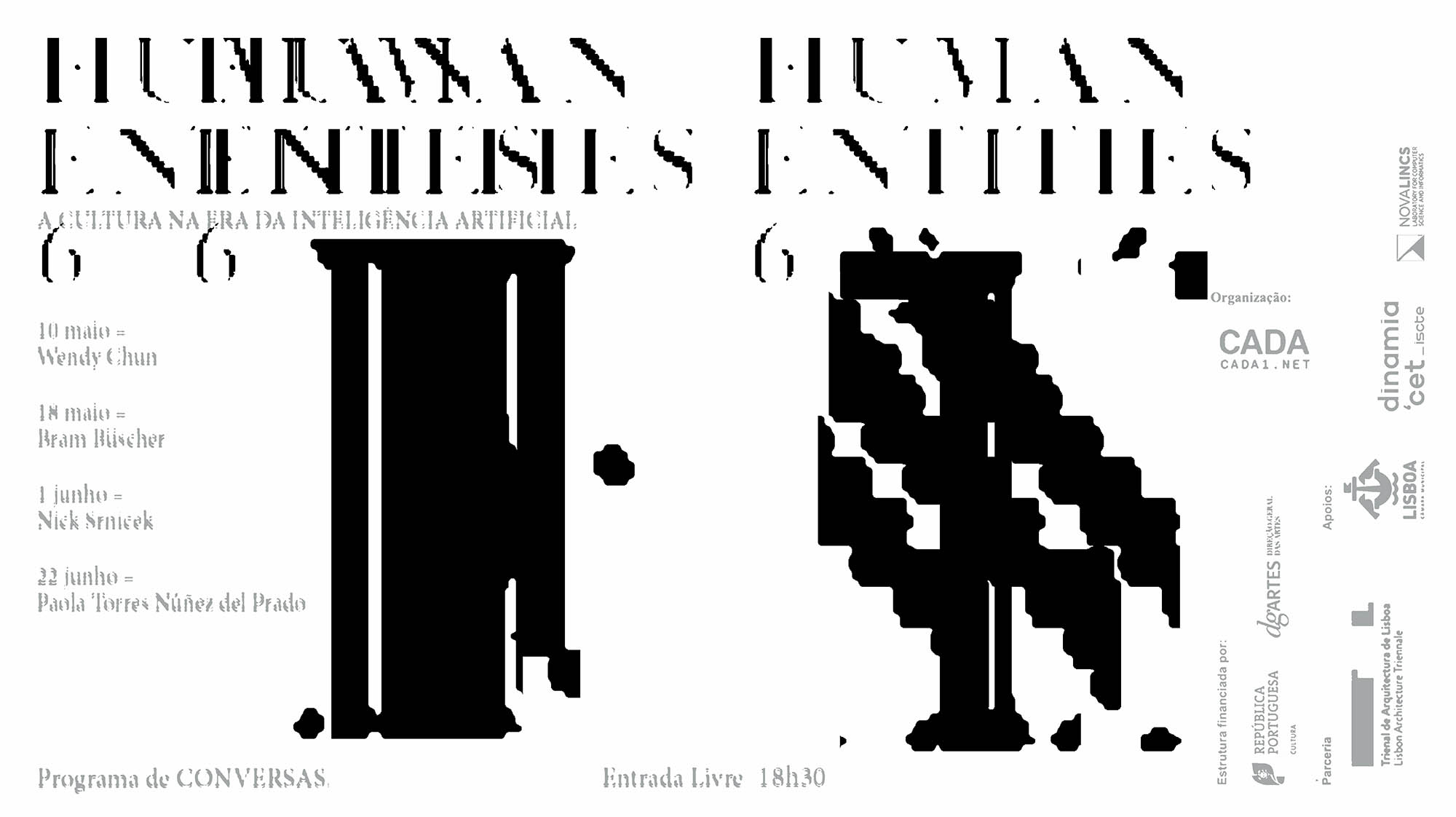
Human Entities 2022: a cultura na era da inteligência artificial
6ª edição
Programa de conversas, Maio – Outubro 2022
Organização CADA em parceria com a Trienal de Arquitectura de Lisboa
Entrada livre, mediante registo
As conversas serão em língua inglesa
[English below]
Sinopse
Embora a verdade tenha sido sempre contestada, nos últimos anos, o conhecimento tácito que serve de terreno comum a partir do qual argumentamos, tornou-se cada vez mais reduzido, como se a realidade consensual estivesse lentamente a desvanecer-se. É difícil dizer se a crise epistémica é uma ideia exagerada ou se é de facto a consequência da negação da ciência, da teoria pós-moderna ou do capitalismo contemporâneo.
Embora a rádio e a televisão continuem a ser grandes difusores, os meios de dizer a verdade mudaram. A ascensão das redes sociais, baseadas na extração de dados, é um fenómeno sem precedentes. E embora a relação destas plataformas com a pós-verdade possa não ser direta, os novos feedback loops entre as nossas vidas sociais, culturais e políticas, devem seguramente desempenhar um papel – assim como o impacto que as tecnologias de inteligência artificial (IA) por detrás dessas plataformas têm nos nossos processos cognitivos coletivos. O nosso objetivo não é descobrir se as redes sociais são boas ou más – claro que são as duas coisas. Para a produção e distribuição cultural as vantagens são, desde logo, claras.
O programa Human Entities 2022 irá debruçar-se sobre o modo como os algoritmos usados para agrupar indivíduos com ideias semelhantes reforçam as nossas visões do mundo, sendo deliberadamente concebidos para fomentar a divisão. Iremos também discutir a pós-verdade enquanto produto do capitalismo de plataforma e examinaremos o modo como as recentes batalhas entre um pequeno número de empresas que pretendem dominar o mercado de IA refletem uma transformação estrutural no poder global. O evento deste ano continua a procurar visões alternativas mais equitativas e ainda o modo como a prática experimental na arte sonora pode oferecer uma saída.
CADA (Jared Hawkey/Sofia Oliveira)
Human Entities é um programa de conversas focado na mudança tecnológica e nos seus impactos – nas formas como a cultura e a tecnologia se influenciam mutuamente.
Programa
Terça, 11 Outubro 2022, 18.30 [reagendado]
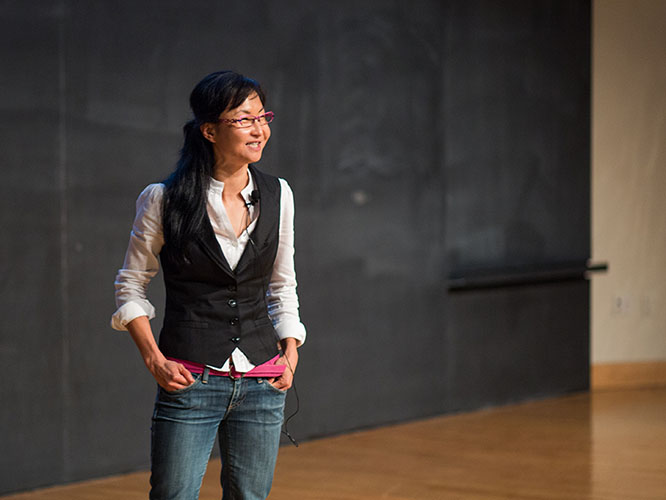
Organizado em parceria com Faculdade de Belas Artes, Universidade de Lisboa, Departamentos de Design de comunicação e Arte Multimédia
Discriminating Data, uma conversa com Wendy Hui Kyong Chun
Wendy Hui Kyong Chun
Cátedra Canadá 150 em Novos Media, Diretora do Digital Democracies Institute
Em Discriminating Data [2021, Dados Discriminatórios], Wendy Hui Kyong Chun mostra como a polarização é um objetivo – não um erro – do big data e do machine learning. Os métodos usados, defende, codificam a segregação, a eugenia e as políticas de identidade através das suas assunções e condições por defeito. A correlação, que fundamenta o potencial de previsão do big data, deriva das tentativas eugénicas do século XX para “procriar” um futuro melhor. Os sistemas de recomendação promovem grupos zangados de semelhança através da homofilia. Através de uma política e tecnologia de reconhecimento, os utilizadores são “treinados” para se tornarem autenticamente previsíveis. Deste modo, a análise de dados e o machine learning tentam perturbar o futuro tornando a perturbação impossível.
Nesta conversa, Chun discutirá os temas do livro com Andrea Pavoni, investigador auxiliar no Centro de Investigação DINAMIA’CET do ISCTE, e com a audiência.
Wendy Hui Kyong Chun
Wendy Hui Kyong Chun é investigadora e professora, tendo recebido a Cátedra Canadá 150 em Novos Media na Universidade Simon Fraser, onde dirige o Digital Democracies Institute. Estudou Engenharia de Sistemas e Literatura Inglesa, que combina no seu trabalho atual em media digitais, e é autora dos livros Control and Freedom: Power and Paranoia in the Age of Fiber Optics (2006), Programmed Visions: Software and Memory (2011), Updating to Remain the Same: Habitual New Media (2016) e, mais recentemente, Discriminating Data (2021).
https://www.sfu.ca/communication/team/faculty/wendy-chun.html
https://mitpress.mit.edu/books/discriminating-data
https://twitter.com/whkchun
Local: Grande auditório, Faculdade Belas Artes de Lisboa, Largo da Academia Nacional de Belas Artes, 4 1249-058 Lisboa
Quarta, 18 de Maio 2022, 18.30
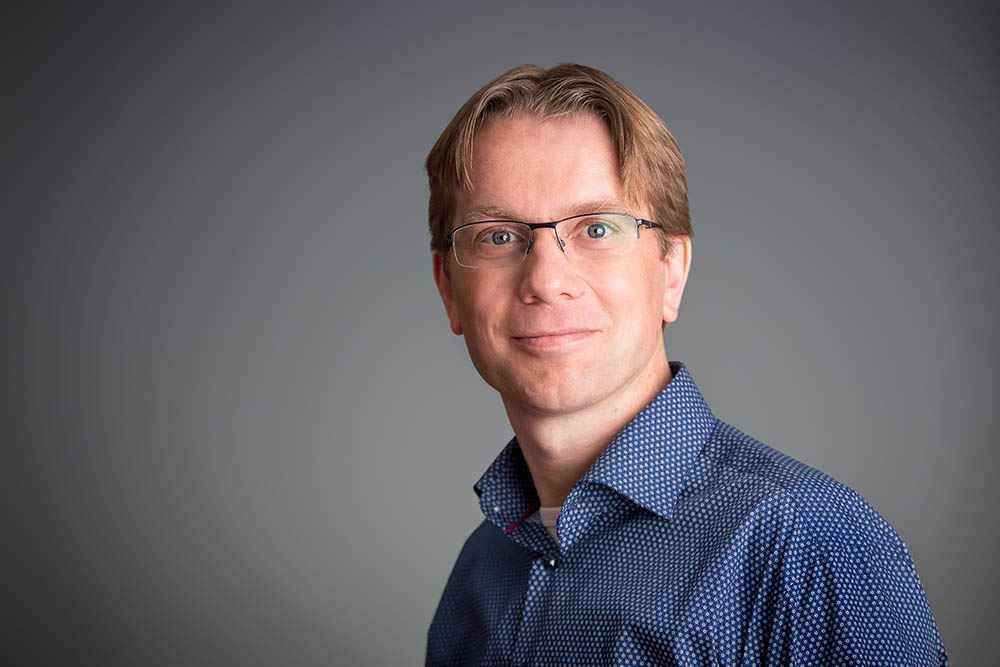
#NatureTruthPower: Política ambiental na era da pós-verdade e das plataformas digitais
Bram Büscher
Professor e Diretor do grupo de investigação Sociologia do Desenvolvimento e Mudança na Universidade de Wageningen
Como é que devemos partilhar a verdade acerca da crise ambiental? Num momento em que até os factos mais básicos sobre ecologia e clima são contestados e desprezados, os defensores do meio ambiente encontram-se num impasse. Alguns viraram-se para as redes sociais e para as tecnologias digitais para mudar a corrente. E se esta estratégia não for apenas ineficaz, como também perigosa?
Nesta apresentação, Bram Büscher mostra como a ação ambiental é transformada através da economia política das plataformas digitais e dos feeds algorítmicos que têm sido cruciais para o surgimento da política da pós-verdade. Baseando-se numa nova compreensão da pós-verdade como uma expressão de poder sob o capitalismo de plataforma, Büscher mostra como os agentes ambientais são mediadores entre as formas estruturais de poder de plataforma e a contingência das questões ambientais em lugares específicos. Central para a compreensão dessa mediação é a reconfiguração das relações entre natureza, verdade e poder no século XXI. Tudo isto resulta na necessidade de uma política ambiental que renove radicalmente a arte de dizer a verdade ao poder.
Bram Büscher
Bram Büscher é Professor e Diretor do Grupo de Sociologia do Desenvolvimento e Mudança na Universidade de Wageningen e Professor Convidado do Departamento de Geografia, Gestão Ambiental e Estudos de Energia da Universidade de Joanesburgo.
O seu trabalho de investigação e a sua escrita debruçam-se sobre economia política do ambiente, com enfoque na biodiversidade, conservação, novos media, digitalização e violência. Desenvolveu o conceito de Natureza 2.0, que se foca na economia política dos novos media e nas suas implicações para a participação na conservação da natureza.
Büscher é autor dos livros Transforming the Frontier: Peace Parks and the Politics of Neoliberal Conservation in Southern Africa (2013), co-autor, com Robert Fletcher, de The Conservation Revolution: Radical Ideas for Saving Nature Beyond the Anthropocene (2020) e The Truth About Nature: Environmentalism in the Era of Post-Truth Politics and Platform Capitalism (2021).
https://brambuscher.com
https://www.ucpress.edu/book/9780520371453/the-truth-about-nature
https://twitter.com/brambuscher
Quarta, 1 de Junho 2022, 18.30
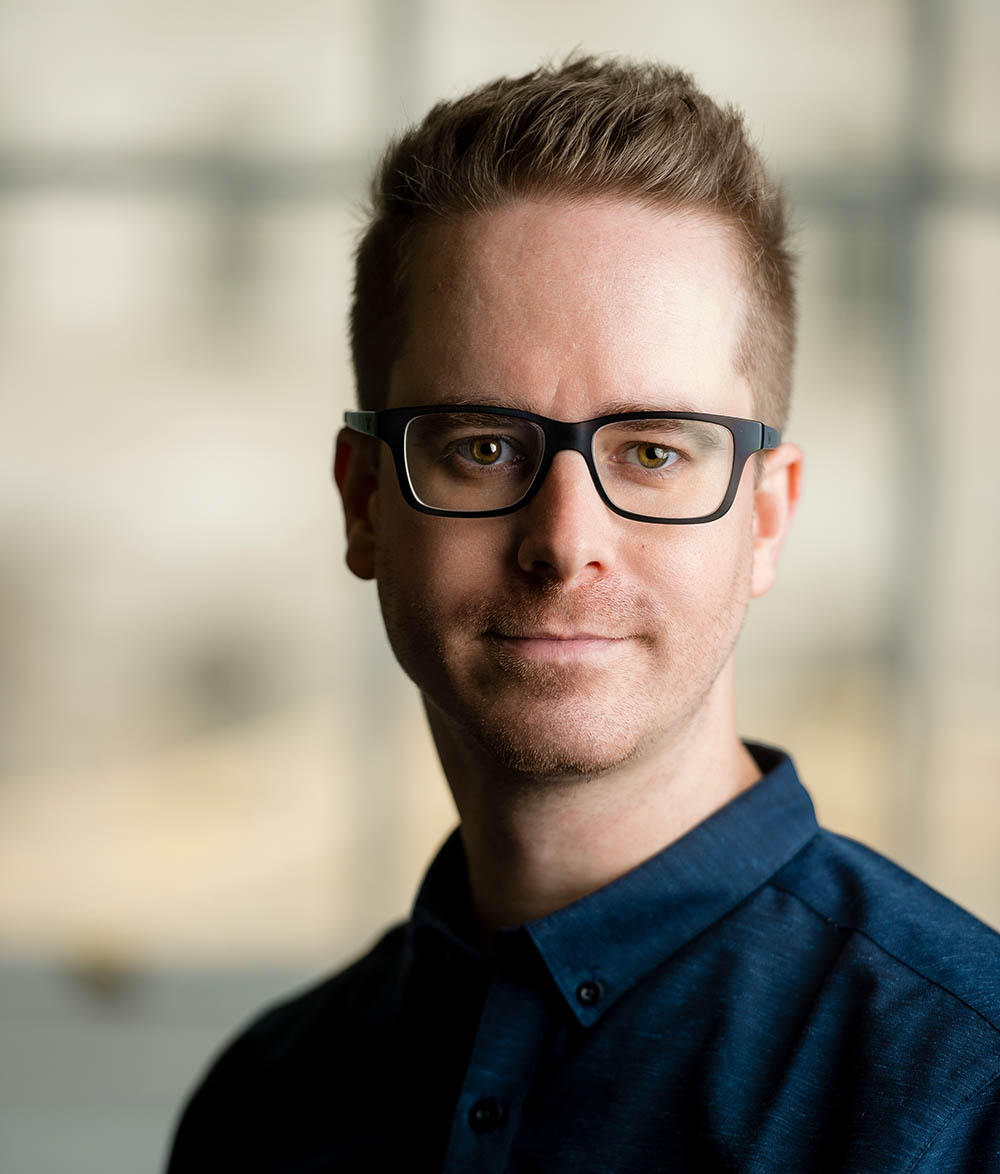
A Economia Política da IA
Nick Srnicek
Professor convidado de Economia Digital, Departamento de Humanidades Digitais, King’s College London
A economia política da inteligência artificial é fundamental para o futuro dos atuais gigantes tecnológicos. No entanto, quando olhamos para a pesquisa existente sobre o impacto da IA na economia, quase toda a atenção se tem focado no que podemos chamar canal de automação/produtividade, discutindo-se essencialmente sobre se, quando e como o alargamento do machine learning irá automatizar e/ou aumentar os empregos existentes. Muito menos atenção tem sido dada ao modo como a natureza da IA atual poderá facilitar a concentração de capital. Esta conversa examinará o impacto da centralização da IA sob o controlo das maiores plataformas planetárias e questionará se outras alternativas poderão ser possíveis.
Nick Srnicek
Nick Srnicek é Professor Convidado de Economia Digital no Departamento de Humanidades Digitais do King’s College London. O seu mais recente livro, Platform Capitalism (2016), estabelece um enquadramento para a compreensão das novidades dos negócios como a Google, Amazon e Alibaba, bem como do modo como as plataformas digitais geram novas tendências nas nossas economias. Atualmente, o seu trabalho de investigação mantém o mesmo foco, examinando a economia política da IA e olhando para o modo como (para além da automação) a IA afetará a dinâmica do capitalismo contemporâneo.
O trabalho de Nick insere-se na longa tradição da política anti-trabalho. O seu primeiro livro, Inventing the Future (2015, com Alex Williams), foi uma tentativa de elaborar uma política anti-trabalho no contexto das mudanças tecnológicas modernas. O seu próximo livro, After Work: The Fight for Free Time (2023, com Helen Hester), procura expandir a política anti-trabalho no campo da reprodução social, olhando para o modo como o trabalho, muitas vezes não remunerado, de limpar, cozinhar e cuidar pode ser reconhecido, redistribuído e reduzido.
https://www.kcl.ac.uk/people/nick-srnicek
https://www.politybooks.com/bookdetail?book_slug=platform-capitalism–9781509504862
https://twitter.com/n_srnck

Nota: por razões técnicas não foi possível gravar esta conversa.
Quarta, 22 de Junho 2022, 18.30
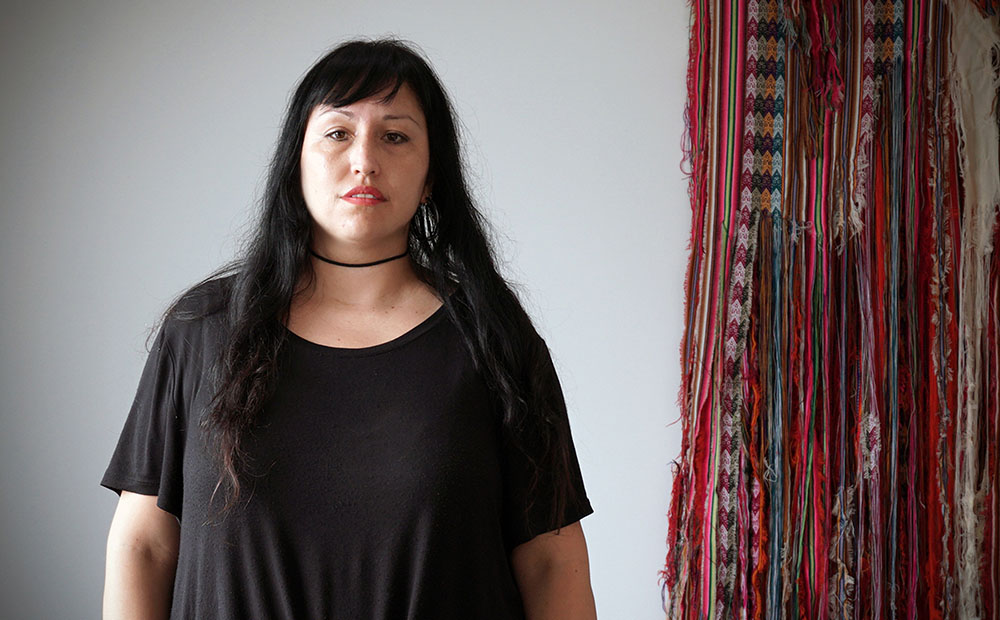
Artist talk
Paola Torres Núñez del Prado
Artista
À semelhança do que se costuma dizer sobre os migrantes, as máquinas autónomas são tidas como uma potencial ameaça a um certo trabalho humano. Em ambientes militares, esses sistemas e a sua eficiência podem, de facto, ser mais letais do que os que são controlados por pessoas. Esta ideia permite-nos regressar à definição fundamental de inteligência desde a Revolução Industrial, profundamente ligada à ideia de eficiência-enquanto-produtividade (e subsequente prevenção de erros), definição que é herdeira de um certo tipo de racionalidade (com origem no Iluminismo) que coloca a inteligência no topo de uma hierarquia onde, por conseguinte, todos os outros sistemas de pensamento humano estão abaixo. Problemas ligados à gestão do ambiente natural (onde outras culturas humanas ´não racionais’ foram encontradas desde então) foram resolvidos através da dominação e até da aniquilação. Agora vemos como alguns sistemas de AI continuam esse legado.
Nesse sentido, AIELSON [um modelo de machine learning que Torres treinou para gerar poesia spoken-word] reflete sobre o zeitgeist, incorporando uma crítica complexa onde o sistema está profundamente ligado à humanidade (como reflexo) na medida em que as imperfeições não são descartadas, mas abraçadas, algo que, por sua vez, contradiz a ideia de inteligência como o epítome da eficiência e perfeição sem falhas. Assim, Torres propõe que falemos de Criatividade da Máquina. Como é que essa criatividade informa a imaginação humana agora? Podemos começar a imaginar outro futuro de possível cooperação entre humanos e máquinas, onde o Mundo Natural deixe de ser visto como um território a ser conquistado?
Paola Torres Núñez del Prado
Partindo da exploração dos limites dos sentidos, Paola Torres Núñez del Prado examina os conceitos de interpretação, tradução e deturpação, refletindo sobre as experiências sensoriais mediadas que, ao (re)construirem a nossa percepção da realidade, servem para estabelecer uma hegemonia cultural na história da Tecnologia e das Artes. Recentemente, recebeu uma Menção Honrosa no Prix Ars Electronica com AIELSON, um sistema desenvolvido durante a sua residência no programa da Google Artists + Machine Intelligence.
As suas performances e obras de arte, que também fazem parte das coleções do Malmo Art Museum e da Public Art Agency of Sweden, têm sido apresentadas em vários países das Américas, Europa Central e Escandinávia, onde vive atualmente.
https://autodios.github.io
http://www.singingtextiles.com
https://twitter.com/autodios
ENGLISH
Human Entities 2022: culture in the age of artificial intelligence
Sixth edition
Programme of public talks, May – October 2022
Organised by CADA in partnership with the Lisbon Architecture Triennale
All welcome, free entry, booking required
Talks in English
Overview
The truth has always been contested. But in recent years the tacit knowledge which provides a common ground upon which people argue has become increasingly reduced, as if consensual reality is slowly slipping away. It’s hard to tell whether this epistemic crisis is an overblown idea or is indeed the consequence of science denial, postmodern theory, or the result of contemporary capitalism.
Clearly, while radio and tv remain big drivers, the means of truth-telling has changed. The rise of social media based on data extraction is unprecedented. And although the link with post-truth might not be direct, the novel feedback loops between our social, cultural and political lives must surely play a part – as do the way AI technologies which power the platforms impact our collective cognitive processes. But it’s not our aim to debate whether social media is good or bad, of course it is both. For cultural distribution and production alone, the advantages are clear.
Human Entities 2022 will focus on how network algorithms used to group like-minded individuals reinforce our worldviews and are deliberately designed to foment division. We will also discuss post-truth as a product of platform capitalism and examine how recent battles between a handful of companies to dominate the market in AI reflect a structural transformation in global power. This year’s event continues to present alternative more equitable visions and we will hear how experimental practice in sound art offers an escape.
CADA (Jared Hawkey/Sofia Oliveira)
Human Entities is a programme of public talks focused on technological change and its impacts – the ways technology and culture influence each other.
Programme
Tuesday, 11 October 2022, 6.30 [rescheduled]

Organized in partnership with the Faculty of Fine Arts, University of Lisbon,Communication Design and of Multimedia Arts departments
Discriminating Data, a conversation with Wendy Hui Kyong Chun
Wendy Hui Kyong Chun
Canada 150 Chair in New Media, Director, Digital Democracies Institute
In Discriminating Data [2021], Wendy Hui Kyong Chun reveals how polarization is a goal—not an error—within big data and machine learning. These methods, she argues, encode segregation, eugenics, and identity politics through their default assumptions and conditions. Correlation, which grounds big data’s predictive potential, stems from twentieth-century eugenic attempts to “breed” a better future. Recommender systems foster angry clusters of sameness through homophily. Users are “trained” to become authentically predictable via a politics and technology of recognition. Machine learning and data analytics thus seek to disrupt the future by making disruption impossible.
In this conversation, Chun will discuss the themes of her book with Andrea Pavoni, assistant research professor at DINAMIA’CET and then take questions from the audience.
Wendy Hui Kyong Chun
Wendy Hui Kyong Chun is the Canada 150 Research Chair in New Media at Simon Fraser University, and leads the Digital Democracies Institute. She studied Systems Design Engineering and English Literature, which she combines in her current work on digital media, and is the author of Control and Freedom: Power and Paranoia in the Age of Fiber Optics (2006), Programmed Visions: Software and Memory (2011), Updating to Remain the Same: Habitual New Media (2016) and, more recently, Discriminating Data (2021).
https://www.sfu.ca/communication/team/faculty/wendy-chun.html
https://mitpress.mit.edu/books/discriminating-data
https://twitter.com/whkchun
Venue: Large Auditorium of the Faculty of Fine Arts (ULisboa), Largo da Academia Nacional de Belas Artes, 4 1249-058 Lisboa.
Wed 18 May 2022, 18.30

#NatureTruthPower: Environmental politics in the era of post-truth and digital platforms
Bram Büscher
Professor and Chair of the Sociology of Development and Change group at Wageningen University
How should we share the truth about the environmental crisis? At a moment when even the most basic facts about ecology and the climate face contestation and contempt, environmental advocates are at an impasse. Many have turned to social media and digital technologies to shift the tide. But what if their strategy is not only flawed, but dangerous?
In this presentation, Bram Büscher traces how environmental action is transformed through the political economy of digital platforms and the algorithmic feeds that have been instrumental to the rise of post-truth politics. Building on a novel account of post-truth as an expression of power under platform capitalism, he shows how environmental actors mediate between structural forms of platform power and the contingency of environmental issues in particular places. Key in understanding this mediation is a reconfiguration of the relations between nature, truth and power in the 21st century. Its upshot is the need for an environmental politics that radically reignites the art of speaking truth to power.
Bram Büscher
Professor and Chair of the Sociology of Development and Change group at Wageningen University
Bram Büscher is Professor and Chair of the Sociology of Development and Change group at Wageningen University and is a visiting professor at the Department of Geography, Environmental Management and Energy Studies at the University of Johannesburg. His research and writing revolve around the political economy of environment and development with specific interests in biodiversity, conservation, new media, digitalization and violence. He developed the concept of Nature 2.0, which focuses on the political economy of new media and its implications for participation in nature conservation. He is the author of Transforming the Frontier: Peace Parks and the Politics of Neoliberal Conservation in Southern Africa (2013), co-author, with Robert Fletcher, of The Conservation Revolution: Radical Ideas for Saving Nature Beyond the Anthropocene (2020) and author of The Truth About Nature: Environmentalism in the Era of Post-Truth Politics and Platform Capitalism (2021).
https://brambuscher.com
https://www.ucpress.edu/book/9780520371453/the-truth-about-nature
https://twitter.com/brambuscher
Wed 1 June 2022, 18.30

The Political Economy of AI
Nick Srnicek
Lecturer in Digital Economy, Department of Digital Humanities, King’s College London
The political economy of artificial intelligence is pivotal to the future of the current technology giants. Yet when we turn to the existing research on AI’s impact on the economy, nearly all the attention has been on what we might call the automation/productivity channel, with discussion centered around whether, when, and how the spread of machine learning will automate and/or augment existing jobs. Much less attention has been given to how the nature of AI today may facilitate the concentration of capital. This talk will examine the impact of AI’s centralization under the control of the major planetary platforms, and ask whether alternatives might be possible.
Nick Srnicek
Nick is a Lecturer in Digital Economy in the Department of Digital Humanities at King’s College London. His most recent book, Platform Capitalism (2016), sets out a framework for understanding the novelties of businesses like Google, Amazon, and Alibaba – as well as how digital platforms generate new tendencies within our economies. His current research is continuing this focus by examining the political economy of AI and looking at how (beyond automation) AI will affect the dynamics of contemporary capitalism.
Nick’s work is also engaged in the long tradition of anti-work politics. His first book, Inventing the Future (2015, with Alex Williams), was an attempt to elaborate an anti-work politics in the context of modern technological changes. His forthcoming book, After Work: The Fight for Free Time (2023, with Helen Hester), seeks to expand anti-work politics into the field of social reproduction by looking at how the often unwaged work of cleaning, cooking, and caring can be recognised, redistributed, and reduced.
https://www.kcl.ac.uk/people/nick-srnicek
https://www.politybooks.com/bookdetail?book_slug=platform-capitalism–9781509504862
https://twitter.com/n_srnck

Note: for technical reasons it was not possible to record this conversation.
Wed 22 June 2022, 18.30

Artist Talk
Paola Torres Núñez del Prado
Artist
Somewhat similar to what it is commonly said about migrants, autonomous machines are taken to be a potential threat to some human labour. In military environments, these systems and their efficiency can, in fact, be more lethal than those controlled by people. This idea allows us to roll back to the core definition of intelligence which, since the Industrial Revolution has been deeply linked with efficiency-as-productivity, and subsequent avoidance of errors. This definition which is the heir of a type of rationality, with origins in the Enlightenment, is placed at the top of a hierarchy above all other human thought systems. Problems linked to managing the natural environment, where other later ‘non-rational’ human cultures are encountered, have been solved through domination and even annihilation. We can now see that some AI systems continue this legacy.
In this context, AIELSON [a machine learning model Torres trained to generate spoken-word poetry] reflects upon the zeitgeist, incorporating a complex critique where the system is seen to be connected to humanity (as a reflection) since imperfections are not discarded but embraced. Consequently this contradicts the notion of intelligence as the epitome of flawless efficiency and perfection. Hence, Torres proposes that we should now discuss machine creativity, and how creativity informs human imagination. Her work asks the question: Can we envision another future of possible cooperation between humans and machines, where the natural world is no longer seen as a territory to conquer?
Paola Torres Núñez del Prado
Paola Torres Núñez del Prado departs from the exploration of the limits of the senses to examine the concepts of interpretation, translation, and misrepresentation, reflecting on the mediated sensorial experiences that (re)construct our perceived reality and that in turn serve to establish a cultural hegemony within the history of technology and the arts. Recently, she received an Honorary Mention at the Prix Ars Electronica for AIELSON, a system developed during her residence on Google’s Artists + Machine Intelligence program 2019-20.
Her performances and her artworks, which are also part of the collections of Malmo Art Museum and the Public Art Agency of Sweden, have been presented in several countries of the Americas, Central Europe, and Scandinavia, where she is currently based.
https://autodios.github.io
http://www.singingtextiles.com
https://twitter.com/autodios
Local/Venue: Palácio Sinel de Cordes, Campo de Santa Clara, 142-145, 1100-474, Lisboa.
Organização CADA em parceria com a Trienal de Arquitectura de Lisboa
Organised by CADA in partnership with the Lisbon Architecture Triennale
Estrutura financiada por/Funded by: República Portuguesa – Cultura / Direção-Geral das Artes
Apoios/Support: Câmara Municipal de Lisboa, DINAMIA’CET (ISCTE-IUL) e/and NOVA LINCS através de fundos da FCT.IP/through FCT.IP funds
Design: Marco Balesteros (LETRA)
Fotografia/ Photography: Joana Linda
Som/Sound: LAMS




